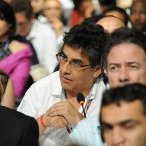English · Español

12 April 2011 | News | Climate Justice and Energy
Lost Time
UN Climate Talks: climate change culprits don’t take responsibility
Download: MP3 (2.7 Mb)
On Friday, several civil society organizations blamed developed countries for the absence of progress in a new round of international climate talks in the framework of the United Nations (UN), that came to an end that day in the capital city of Thailand, Bangkok.
Friends of the Earth England, Wales and Northern Ireland, Christian Aid, Jubilee South and the Third World Network welcomed the role of developing countries that are taking joint responsibility for 65 per cent of world emission cuts.
The official negotiations in Bangkok started on April 3rd and served as a preparation for the 17th UN Conference of the Parties (COP17) on Climate which will take place in December, in Durban, South Africa. “In Bangkok it has been developing countries that have come out with a clear vision of how to move forward on all the important issues in the negotiations in order to meet the central goal of these negotiations – emission reductions in line with the science and equity,” Lim Li Lin, Senior Kyoto Protocol Analyst at Third World Network said in a joint press release.
That same day, Bolivian UN Ambassador, Pablo Solon, said that official figures show that the emission reduction commitments of the developing world are much higher than those of the developed countries. Rich nations are the main culprits of the current climate crisis (as the UN acknowledges), due to their greenhouse gas emissions produced since mid 19th Century.
The UN figures Solon is making reference to show that 65 per cent of emission cuts will take place in developing countries if we take into account offset mechanisms used by rich countries, such as the carbon market. Only 35 per cent of cuts will take place in the Global North with the current level of pledges on the table.
"In total this analysis shows that, with the use of offsets 3.6 gigatonnes of emission reductions will happen in developing countries in contrast to just 1.9 gigatonnes in developed countries", said Ambassador Solon in a press conference according to a press release issued by the Bolivian government.
“This reveals the hollow truth of any claims by the EU and other rich developed countries that they are serious about actually reducing carbon pollution.” Asad Rehman, Senior Campaigner International Climate of Friends of the Earth (EWNI) said according to the joint press release issued by the civil society organizations.
“Behind the fight over the agenda lies a real struggle over the future of the planet, what’s at stake is either a discussion over real emission reductions or, as the US would like, a technical talk-fest that will do nothing to secure a safe climate and a safe planet” said Rehman.
On April 5th, during the Bangkok talks, Bolivia, Cuba, Dominica, Ecuador, Nicaragua and Venezuela stated, in the name of the Bolivarian Alliance for the Peoples of our America (ALBA), their deepest concern over the fact the Cancun Agreement (at the COP16 in December 2010) was closed after leaving aside the formal and explicit rejection of a Member State.
On December 11th, 2010, when the Cancun talks were about to close, Bolivia rejected the final documents and considered them utterly insufficient to fight the climate crisis. The agreements in the framework of the UN climate talks should be agreed by consensus. While there wasn’t consensus, the Mexican presidency of the COP considered the texts were approved, which is now denounced by the ALBA countries.
In general terms, the Cancun Agreement doesn’t force emission reductions on developed countries, it strengthens carbon markets (offsets of emissions by rich countries), it considers forests as carbon sinks and undermines the rights of indigenous peoples. The text doesn’t even come close to highlighting the urgency raised by the science to address the climate crisis.







